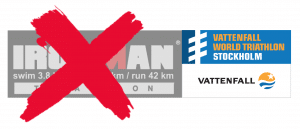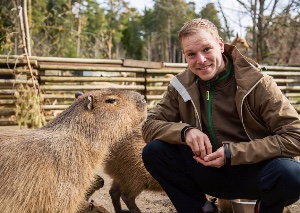The Window of Opportunity
 Right at this moment I’m in a dilemma if I should train the next 2 weeks for a triathlon. The race is called IronMan, it’s a big triathlon race. I’m not able to do a full one but half should be ok, although that’s what I think. The hardest part is that 2,5 weeks is not a lot of time to train for a 1,9km swim, 90km cycle and 21km run so decisions have to be made to do it yes or no. My window is not very big due to the time that I need for myself to practise. If I’m to late deciding I might not go full into my practises for this race. It’s kind of a condition test for myself but let’s see.
Right at this moment I’m in a dilemma if I should train the next 2 weeks for a triathlon. The race is called IronMan, it’s a big triathlon race. I’m not able to do a full one but half should be ok, although that’s what I think. The hardest part is that 2,5 weeks is not a lot of time to train for a 1,9km swim, 90km cycle and 21km run so decisions have to be made to do it yes or no. My window is not very big due to the time that I need for myself to practise. If I’m to late deciding I might not go full into my practises for this race. It’s kind of a condition test for myself but let’s see.
But let’s talk a bit more about decisions… We make many decisions in our life time, some good and some bad. Some will be quick and some will be super slow. Why are some decisions slower and others quicker? If we have a lot of time to decide, us as people will take this time till the last second where we have to decide. If we get a particular option and have to decide we will decide right away, this decision connects to the consequence we get afterwards. For example, I’m doubting about my decision for this IronMan challenge because I’m not forced to make a decision yet. I don’t mean forced in a bad way but it basically means that if somebody would say if you don’t make the decision yourself in 2 days I will do it for you. You will make the decision a lot quicker. The window of opportunity is smaller right away. Where you thought, you had 1 week to decide you have now 2 days.
This works the same way when somebody would ask me to drive them home. When I discover I will receive something for it, the answer the person most likely will get will be quicker than when I think there is nothing for it then me being nice to that person. The consequence is an important factor in the window of opportunity. When the consequence is set correctly the window of opportunity could be a lot smaller.
 Before we say all animals should be quick on signals I want to tell you about a small story. For me working birds of prey is a very new challenge and I’m happy we have a strong experienced team at the zoo I work at. I believe the science of operant condition works with every animal the same even with birds of prey. This team is open enough to try it with great success. They do such a great job, let me tell you.
Before we say all animals should be quick on signals I want to tell you about a small story. For me working birds of prey is a very new challenge and I’m happy we have a strong experienced team at the zoo I work at. I believe the science of operant condition works with every animal the same even with birds of prey. This team is open enough to try it with great success. They do such a great job, let me tell you.
Now coming from the marine mammal world, the animals are mostly trained to respond quick to the signals we give.
 Its very cool to see that falcons or hawks are able to respond the same way. But then there are Owls… Owls are different. Owls are slower in their response, at first I thought it was just how we train them, oke maybe a little bit but we can’t forget that an owl is not a falcon. Its specie depending. A walrus will not act the same as a sea lion and a killer whale not the same as a dolphin. I do not think we should blame the animal to quickly but we have to take this into consideration.
Its very cool to see that falcons or hawks are able to respond the same way. But then there are Owls… Owls are different. Owls are slower in their response, at first I thought it was just how we train them, oke maybe a little bit but we can’t forget that an owl is not a falcon. Its specie depending. A walrus will not act the same as a sea lion and a killer whale not the same as a dolphin. I do not think we should blame the animal to quickly but we have to take this into consideration.
The window of opportunity is part of our training. Asking and animal to target and it takes the animal 5 seconds to respond to touch the target is for me to long of a wait. When an animal understands the target in such a way it’s reinforced by the trainer. To get the animal to understand to do it quicker, we could take the target away after 3 seconds. This means look here is a chance of reinforcement if you touch it within 3 seconds if not the target is gone and your chance as well. This tightens the window of opportunity right away. Every behaviour has such a window. Of course we need to look at the rate of success before we decide we take such a quick step. The latest blog about (Link) The balance of Reinfrocent should be considered as well, especially when the animal responds quicker to touch the target in this case. We use this a lot with the recalls we train at the zoo. When we started with the lions we gave them a minute as criteria time to come inside, if some of them didn’t make it we would close the gate no matter what. Of course, after an established and high rate of success from the animals. To keep it as tight as possible we would say that we close the gate after a minute. 50 seconds was their time 9 out of 10 times but that one time would be different. After closing the gate the chance of reinforcement was gone for the animals who stayed outside. Although we would ask another signal after an x amount of time had passed so those outside would be correct within the criteria time we decided to be for the recall. Obviously this is one of the options, we could also let them be and next time hope for the best. As we know there are many good ways to respond all with their own thoughts behind it.
 Thinking about the window of opportunity will help you get your animals to respond quicker to signals depending on the species. Most of the time slow responses are reinforced, it could also be that there is no difference between a slow or a quick response due to the consequence. If the consequence is the same for both responses of the animal why would they be quick, there is no reason to. Depending on what you want is what you reinforce. For example: when we started training the gorillas a recall we knew they could do this quick but we decided that we want a slow response for the animals not to crush each other in the hall ways. What means that the infrastructure depends on the time criteria we set for the Gorillas. Another example are animals who are older and rest a bit longer. They might have stiff joints as we do when we get older. We can’t expect them to be super quick on a recall in this case just because of their own health. Although we know that some animals could be quick there is more to consider regarding those types of behaviours.
Thinking about the window of opportunity will help you get your animals to respond quicker to signals depending on the species. Most of the time slow responses are reinforced, it could also be that there is no difference between a slow or a quick response due to the consequence. If the consequence is the same for both responses of the animal why would they be quick, there is no reason to. Depending on what you want is what you reinforce. For example: when we started training the gorillas a recall we knew they could do this quick but we decided that we want a slow response for the animals not to crush each other in the hall ways. What means that the infrastructure depends on the time criteria we set for the Gorillas. Another example are animals who are older and rest a bit longer. They might have stiff joints as we do when we get older. We can’t expect them to be super quick on a recall in this case just because of their own health. Although we know that some animals could be quick there is more to consider regarding those types of behaviours.
A Window of Opportunity occurs in every behaviour. Do you want slow or quick decision making from your animals?

Peter Giljam
“Thinking Outside the Zoo”
info@Zoospensefull.com





1 Comment